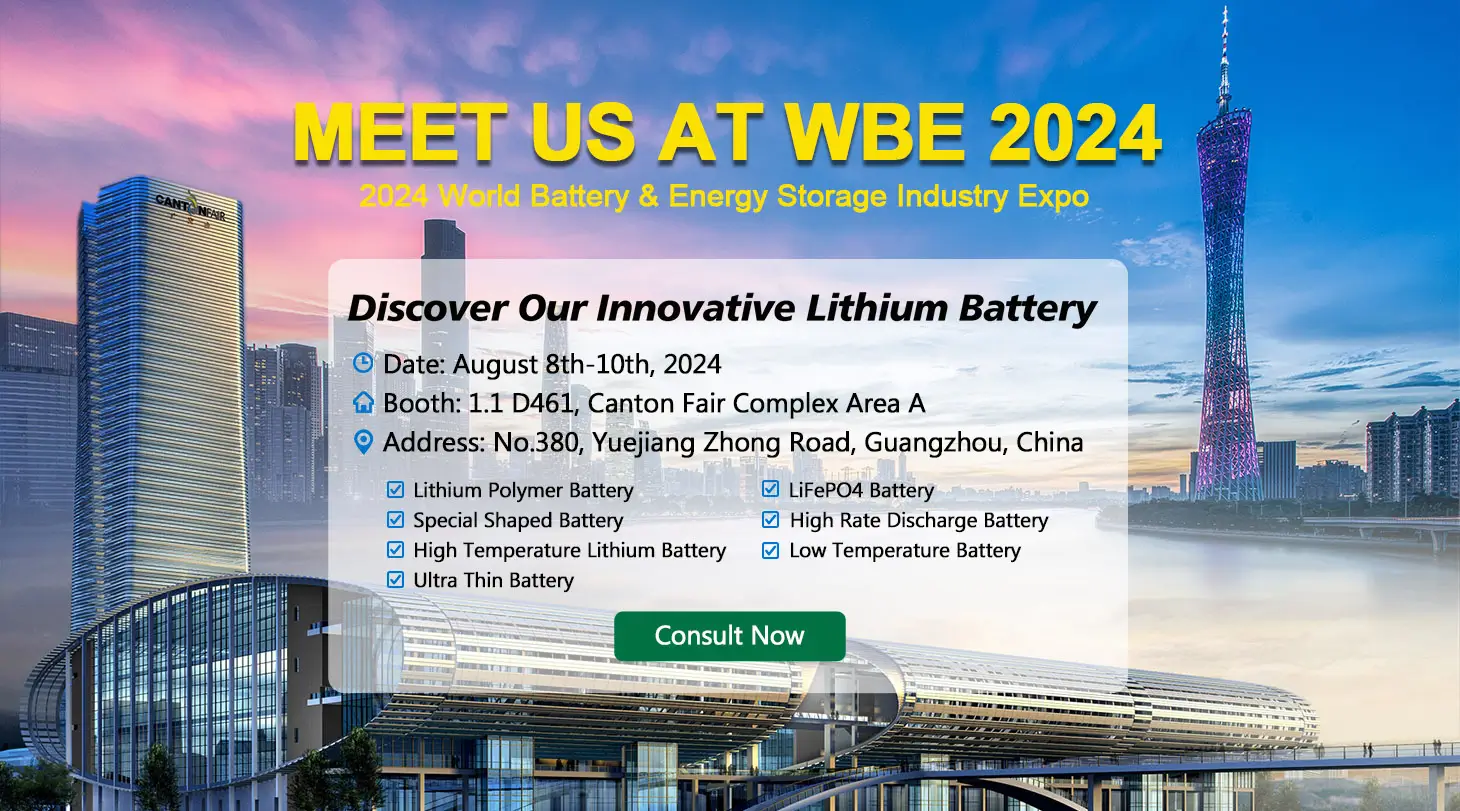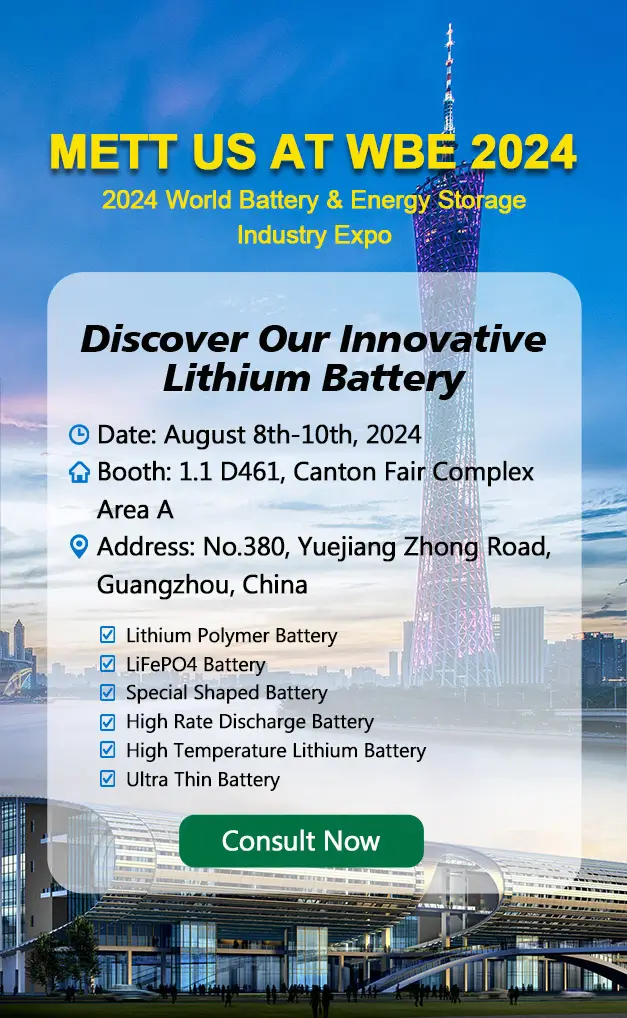Deep cycle batteries are unique in providing long-lasting and sustainable energy for an extended period for the users. Even its lifetime ranges between 3 to 6 years. However, it is used for many applications and requires continuous or cyclical power delivery.
This guide will teach you in-depth about deep cycle batteries, their key features and functions, critical types of deep cycle batteries, 5 top deep cycle batteries, and more details. Let’s get down in detail!
Part 1. What is a deep-cycle battery?
A deep-cycle battery is a type of battery that can sustain power for an extended period. In this case, these batteries are highly suitable for regular discharging and recharging applications.
Key features:
- Provides a steady flow of power over a long period. Hence, it is highly suitable for renewable energy storage, electric vehicles, golf carts, marine vessels, and RVs.
- Deep cycle batteries can be discharged to a lower level than conventional batteries. Also, they have the power to handle 80% of discharge.
- It has a longer lifespan since it consists of thick lead plates and unique compositions.
- It comprises various chemistries such as flooded lead-acid, sealed lead-acid (AGM and gel batteries), and lithium-ion.
Key functions:
- Ability to store electrical energy generated from solar panels or wind turbines.
- They are considered a suitable power source for electric motors and devices handy for applications such as golf carts, forklifts, trolling motors, and RV appliances.
- They are considered backup power sources when used to maintain uninterrupted operations.
Part 2. Types of deep cycle batteries
The following are the main types of deep-cycle batteries:
- Flooded Lead-Acid Batteries (FLA): They are the commonly used traditional type of deep battery consisting of electrolytes.
- Sealed Lead-Acid Batteries (SLA): SLA is also known as Valve-Regulated Lead-Acid (VRLA) batteries. These batteries are available in two main types: Absorbent Glass Mat (AGM) and Gel batteries.
- Absorbent Glass Mat (AGM) Batteries: The AGM battery uses a fiberglass mat. A fiberglass mat helps absorb electrolytes and has a high power density.
- Gel Batteries: Gel batteries consist of silica gel electrolytes providing high resistance features to even extreme temperatures.
- Lithium-Ion Batteries: Lithium-ion deep-cycle batteries use a new technology. Hence, they have a high energy density, making them practical for users.
Part 3. Reviewing the best deep cycle batteries on the market
OPTIMA Batteries OPT8016-103 D34M BlueTop
The OPTIMA Batteries OPT8016-103 D34M BlueTop is one of the best deep-cycle batteries to enhance your vehicle performance. It highlights specifications for high durability and AGM construction. Also, it consists of a 120-minute reserve capacity to maintain sustainable power.
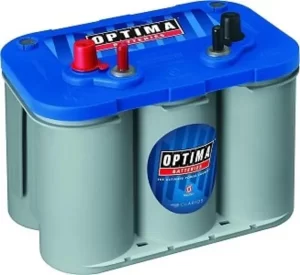
Pros:
- AGM Construction.
- Long Reserve Capacity of 120 minutes.
- High durability and reliable performance.
- It consists of a lightweight design.
- Has a reliable cranking power.
Cons:
- Less battery life expectancy.
- Less shipping quality.
Ufine 12V LiFePO4 Battery
Ufine 12V LiFePO4 Battery provides excellent versatility and a wide range of customization options. For example, they offer to customize the battery’s shape based on your requirements. It is made from lithium iron phosphate (LiFePO4) technology and helps to maintain reliable and high performance of 10Ah to 250Ah capacities.
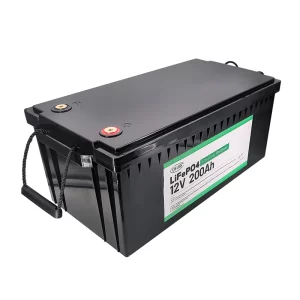
Pros:
- It can be customized to various shapes and sizes.
- Consists of high energy density.
- Minimal memory effect.
- Low self-discharge rates.
- Excellent performance.
Cons:
- Delivery may require additional time during the customization process.
Odyssey 34-PC1500T Automotive and LTV Battery
Odyssey 34-PC1500T Automotive and LTV Battery is another reliable deep-cycle battery with automotive excellence. It is known for its high durability power and the ability to withstand challenging situations when the battery is in use. Also, it is considered to be an effective, versatile option.
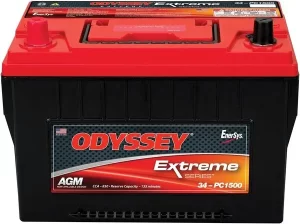
Pros:
- Has rigid AGM Construction to maintain long-lasting performance.
- Used for dual-purpose applications.
- It has a 70% longer life compared to other batteries
- It consists of a fast recharge time
- Possess a reliable performance.
Cons:
- The battery may be heavier compared to others.
- Users have faced dissatisfaction with warranty terms.
Interstate Batteries 12V 110 AH SLA/AGM Deep Cycle Battery
Interstate Batteries 12V 110 AH SLA/AGM Deep Cycle Battery is a reliable option for maintaining high efficiency. It has a 110 amp-hour capacity, ensuring high durability and reliability for users. Also, it can provide excellent performance on just a single charge.
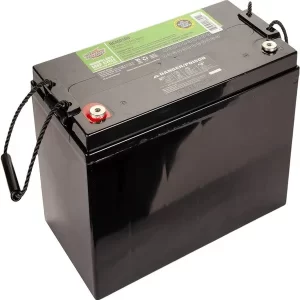
Pros:
- Consists of a 110 amp-hour capacity.
- Ability to work in even sturdy construction
- Consist of a consistent and reliable performance.
- Supports long-lasting usage.
- It requires only minimal maintenance.
Cons:
- It consists of a sealed lead-acid type.
- Has a report of warranty issues.
NoJoke 12V 50Ah Battery
The NoJoke 12V 50Ah Battery is a compact solution consisting of a greater level of efficiency and effectiveness. The key highlight is that it holds a lightweight design and a 50 amp-hour capacity. Hence, it ensures to provide excellent performance at an unbeatable cost.
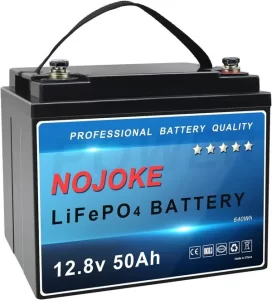
Pros:
- Consists of a lightweight design of less than 13 pounds.
- Has a 50 amp-hour capacity.
- Consist intuitive safety features.
- Provides high-quality performance.
- Being smaller in size is suitable for compact spaces.
Cons:
- Consists of minor assembly issues.
- Has functionality issues.
Part 4. Factors to consider when choosing a deep cycle battery
The following are the key factors to consider when you choose a deep-cycle battery:
- Battery type: Identify the best features that fit your requirements, depending on the costs, maintenance, and performance you require.
- Capacity: Acknowledge the capacity of the battery needed to avoid premature depletion.
- Voltage: Figure out the specific voltage rating based on your needs. For example, deep-cycle batteries are available in 6V, 12V, and 24V.
- Cycle life: Check the expected cycle life of the battery based on the charge-discharge cycles.
- Discharge depth: Choose the correct battery with a suitable discharge depth, as it affects its performance and lifespan.
Part 5. Deep cycle battery applications
The following are the typical applications of deep-cycle batteries:
- Renewable Energy Storage: Widely used in renewable energy sources such as solar and wind power installations.
- Marine and RV Power Systems: Helps power power electrical systems on boats, yachts, sailboats, and recreational vehicles (RVs).
- Golf Carts and Electric Vehicles: Widely used in golf carts, electric scooters, electric bicycles, and other low-speed electric cars.
- Telecommunications: Used as backup power sources in critical telecommunications infrastructure such as cellular towers, radio base stations, and data centers.
- Forklifts and Material Handling Equipment: Aids to power electric forklifts, pallet jacks, order pickers, and other material handling equipment
Part 6. Final Thoughts
In conclusion, even though there is a wide range of deep-cycle batteries, considering your needs and their specifications, you can narrow down your decision.
However, we have given you a comprehensive list of the best deep-cycle batteries to ease your findings! This guide helped you find the best deep-cycle battery for your unique requirement.
Part 7. FAQs
-
What is the best brand of deep-cycle batteries?
The best brand of deep cycle batteries is Ufine’s 12V LiFePO4 Battery. It offers highly versatile and customizable options, including 10Ah performance to 250Ah capacity. -
What should you look for when buying a deep-cycle battery?
Factors to look for when buying a deep cycle battery are battery size, voltage, capacity, battery type, cycle life, and discharge depth. -
What is the life of a deep-cycle battery?
The life of a deep-cycle battery is between 3 to 6 years. However, it depends on the battery’s brand, performance, and capacity. -
What is the most common deep-cycle battery?
The most common deep-cycle battery is a Wet lead acid battery. It consists of a liquid combination of water and acid, keeping it upright.
Related Tags:
More Articles
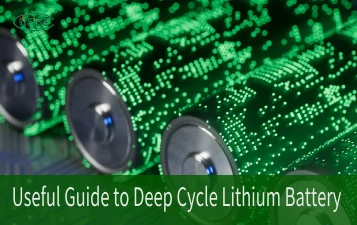
Overview of Deep Cycle Lithium Battery
In this article, we explore the life, voltage, capacity, and charging considerations of deep cycle lithium batteries.
How Long do Lithium Batteries Last?
How long do lithium batteries last? we will explore the factors that influence the lifespan of lithium batteries and provide insights into their longevity.
How to Choose the Best LiFePO4 Battery?
Choose LiFePO4 batteries for superior performance, safety, and versatility in EVs, UPS, and backup power. This guide helps you make informed decisions.
Get 12v Lithium Car Battery As a Power Source for the Ride
Make the right choice for your vehicle's battery needs by installing a 12 volt lithium car battery. You will enjoy maintenance-free longevity with this change.
Everything About A Small Lithium Ion Battery
Discover the features, uses & future potential of a small lithium ion battery. A compact and tiny powerhouse ideal for smartphones, wearables, drones & more.



